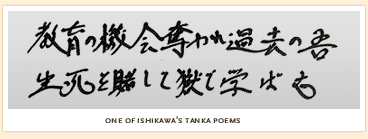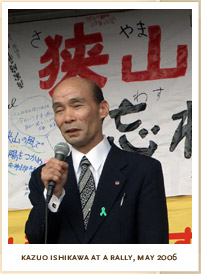While I appealed my case, a detention center employee took interest in my case and decided that if I were really innocent, I would need to know how to read and write to be able to fight the court’s decision. With his help, I started to read about Buraku discrimination and realized that I was of Buraku descent. I learned that this was the reason why I was in jail. At about the same time, the Buraku Liberation League got involved in my case. They gave me things to read, about Buraku history and Buraku discrimination, but also about what was going on in the world outside of prison. I started to learn that there was a whole movement out there of people like myself. I had never known this before, and if I hadn’t learned to read and write, I would never have known my own history.
As a child, I was often made fun of but didn’t realize that it had anything to do with larger social issues. I thought it was just because of me and my family. If I went to the neighborhood on the other side of the train tracks, kids there would yell at me to leave, to go back home, that they didn’t want people like me there. Sometimes they even threw rocks at me and my brothers and sisters. At school, other kids would make fun of me for not changing my clothes or for smelling bad.
I thought this was just because my family was really poor. Japan was still recovering from the war, and food and work were scarce. They were even scarcer for Buraku people. We were a family of eight kids and never had enough food, and I remember always being hungry. Our parents would send us out to scavenge, and we would go to nearby farms and ask for the stuff they were going to throw away or feed the chickens. We brought back eggshells and rice husks for the family. We got so hungry we ate grass, whatever we could find. When we were really lucky, we caught rats, lizards, and snakes and ate them.
This is why the police investigators were able to convince me to confess to a crime I didn’t commit. At the time of the crime, my older brother was the only person in the family with a regular income. The police told me that my brother’s footprints matched those found at the crime scene, and that if I wanted to protect him, I should confess to the crime myself. They told me that the maximum sentence I would get would be ten years in prison. That seemed like an easy choice – ten years locked up for me or leaving my family without any money at all. After I confessed, though, things didn’t turn out the way the police had told me. I was sentenced to death, and my brother lost his job anyway, because people refused to employ someone related to a confessed murderer. My younger sister was harassed out of school. Those years that I was in prison were tough for me, but they were also really tough for my family, who had to struggle every day to find food to eat. The Buraku Liberation League helped my family during those hard times.
My parents never told us anything about Buraku issues. I don’t even know if they ever even mentioned the word. They had to have known it, had to have some idea that they were from a Buraku, but they never told us anything about it.
We didn’t learn about it in school either, and truthfully I didn’t have the opportunity to learn much of anything in school. I went to school through the fifth grade, but that’s a little misleading. I may have gone to the school building whenever my family didn’t need me to do something else, but I didn’t really ‘go to school.’ My family couldn’t afford pens or paper, much less notebooks or textbooks. So although I did go to school, I didn’t really learn anything. My family often needed me to work or find food. But my teachers never asked why I was missing so much school. They never came to my house or expressed any worry about me not doing anything.
So I didn’t learn to read and write until the detention center employee started teaching me. He sat with me for hours, teaching me characters and grammar. And it was only after those years of study in jail that I learned that the things I had experienced as a child were something happening all over Japan. I learned that I was from a Buraku and that’s why my family faced such poverty and that’s why I went to jail for a crime I didn’t commit.
Writing also helped me in other ways. Once my sentence was reduced to life with hard labor, I was moved from the detention center to a regular prison. There, inmates are not allowed to talk to each other. When I wrote a letter to someone and got a response back, it was like a whole new world opened up to me. Suddenly I was able to talk to people, and I wasn’t nearly as alone as I had been before. I wrote back and forth to people from all over the country. I realized even more that people all over Japan were facing Buraku discrimination, and struggling in ways that I myself was struggling. Being able to read and write connected me to these people and to a movement, giving me hope that one day I would be free and that Buraku discrimination would come to an end.
One of the other inmates on death row taught me about poetry. He told me that it was a good way to say lots of things with few words. I started studying tanka, which I learned later is actually a really difficult form of classical Japanese poetry, and I started reading dictionaries to increase my vocabulary and give me the flexibility to express my feelings. I wrote poetry throughout my time in prison, and I still write it today. It gives me a way to put words to the frustration I have with a system that allowed this to happen to me, and it gives me a way to help change that system, so that no one will ever have to go through what I did.

I have been on parole now for over ten years. I had the opportunity to get married, and have strengthened my ties with the political movement I have been involved in since I was sentenced. I work with the Buraku Liberation League, touring the country to talk about Buraku discrimination and the Sayama case, and I have been working with IMADR and the Citizen's Support Group for the Sayama Case, which are both campaigning for justice in the Sayama Case.
My time in prison was difficult, but it did give me things that are still extremely important to me. I learned to read and write, and I received books and letters from people all around the country. I also learned that I am from a Buraku and linked to a group of people with a long history. I connected with a movement that extends beyond me and affects the lives of thousands of people all over Japan. It is for these people as much as for myself that I fight for recognition of my innocence.
